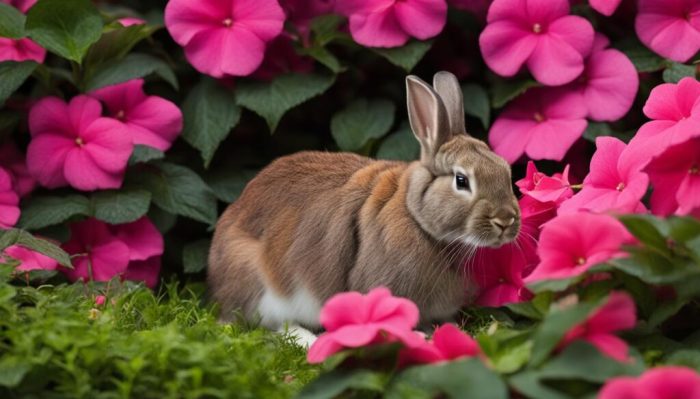Impatiens, commonly known as jewelweed or touch-me-not, are a diverse genus of flowering plants. These plants are native to various regions worldwide and are often found in moist, shady areas. They are known for their vibrant blooms and rapid growth, making them popular choices for gardens and landscaping.
Rabbits are herbivores with a voracious appetite for plants. Their diet consists primarily of grasses, hay, and vegetables. However, their curiosity and willingness to explore new food sources can sometimes lead them to consume plants that may be harmful to their health.
Introduction

Impatiens, also known as jewelweed or touch-me-nots, are a genus of flowering plants in the family Balsaminaceae. They are characterized by their showy, often brightly colored flowers and their ability to shoot seeds when touched.
Understanding rabbits’ dietary habits is important for several reasons. First, it helps us to ensure that our pet rabbits are getting the nutrients they need to stay healthy. Second, it can help us to prevent rabbits from damaging our gardens and other plants.
Third, it can help us to manage wild rabbit populations.
Impatiens Toxicity
Impatiens are not typically considered to be toxic to rabbits. However, they do contain a compound called impatiens saponin, which can cause skin irritation in some animals. If a rabbit ingests a large amount of impatiens, it may experience gastrointestinal upset, such as diarrhea or vomiting.
Impatiens Toxicity
Impatiens plants contain a toxic compound known as impatientol, which is found in all parts of the plant, including the leaves, stems, and flowers. Impatientol is a diterpenoid glycoside that can cause various adverse effects on rabbits if ingested.
Ingestion of impatiens can lead to gastrointestinal distress, including vomiting, diarrhea, and abdominal pain. In severe cases, it can also cause neurological symptoms such as tremors, seizures, and difficulty breathing. Additionally, impatiens can cause skin irritation and allergic reactions in some rabbits.
Mechanism of Toxicity
Impatientol acts by inhibiting the sodium-potassium pump in cell membranes, leading to an imbalance in ion concentrations. This disruption can affect the normal functioning of various tissues and organs, particularly those that are highly dependent on ion gradients, such as the heart and nervous system.
Rabbit Feeding Habits
Rabbits are herbivores, meaning their natural diet consists primarily of plants. In the wild, rabbits graze on a variety of grasses, herbs, leaves, and twigs. They are selective feeders, choosing plants that are high in nutrients and low in toxins.Several
factors influence rabbits’ food preferences, including their age, sex, and health status. Younger rabbits typically have a higher appetite and consume more food than older rabbits. Male rabbits tend to eat more than females, and pregnant or nursing rabbits require additional nutrients to support their offspring.
Rabbits with certain health conditions may also have specific dietary needs.Rabbits are not native to North America, and many of the plants found in this region can be toxic to them. It is important for rabbit owners to be aware of the potential risks of rabbits consuming non-native plants and to provide them with a safe and nutritious diet.
Alternative Food Sources
Rabbits require a balanced diet consisting of various plant-based foods to maintain optimal health. While impatiens may be toxic to rabbits, there are numerous other safe and nutritious food sources available.Providing a balanced diet is crucial for rabbits, as deficiencies or excesses in certain nutrients can lead to health problems.
An unbalanced diet can result in malnutrition, digestive issues, and other health concerns.
Hay and Grass
Hay and grass should constitute the majority of a rabbit’s diet. These foods provide essential fiber, which promotes a healthy digestive system and prevents dental problems. Choose high-quality hay such as timothy hay or orchard grass hay. Fresh grass can also be offered in moderation.
Leafy Greens
Leafy greens are another important component of a rabbit’s diet. They provide vitamins, minerals, and antioxidants. Safe leafy greens for rabbits include romaine lettuce, spinach, kale, and dandelion greens.
Vegetables
Vegetables can provide additional nutrients and variety to a rabbit’s diet. Suitable vegetables for rabbits include carrots, celery, broccoli, and bell peppers. Avoid vegetables high in sugar, such as bananas and grapes.
Fruits
Fruits can be offered as occasional treats in small quantities. Choose fruits low in sugar, such as apples, blueberries, and strawberries.
Water
Fresh water should be available to rabbits at all times. Water helps prevent dehydration and supports overall health.
Prevention and Management
Preventing rabbits from consuming impatiens is crucial for their well-being. Removing impatiens from areas accessible to rabbits is paramount. Secure fencing or physical barriers can deter rabbits from entering gardens or areas where impatiens are present. Additionally, keeping impatiens trimmed and removing fallen flowers can reduce the risk of ingestion.
Treating Rabbits that have Ingested Impatiens
If a rabbit has ingested impatiens, prompt veterinary attention is essential. The veterinarian may induce vomiting to remove any remaining plant material and administer activated charcoal to absorb toxins. Intravenous fluids may be provided to support hydration and prevent dehydration.
Monitoring the rabbit’s vital signs and providing supportive care is also crucial during recovery.
Summary
In conclusion, impatiens can be toxic to rabbits if ingested in large quantities. Therefore, it is essential to keep these plants out of reach of rabbits. If you suspect your rabbit has consumed impatiens, seek veterinary attention immediately. Providing your rabbit with a balanced diet of hay, fresh vegetables, and pellets is crucial for their overall health and well-being.
Q&A
Can rabbits eat impatiens?
Rabbits should not eat impatiens as they are toxic to them.
What are the symptoms of impatiens poisoning in rabbits?
Symptoms of impatiens poisoning in rabbits can include gastrointestinal upset, respiratory distress, and seizures.
What should I do if my rabbit eats impatiens?
If you suspect your rabbit has eaten impatiens, contact your veterinarian immediately.
Are there any safe alternatives to impatiens for rabbits?
Yes, there are several safe alternatives to impatiens for rabbits, such as dandelion greens, clover, and plantain.